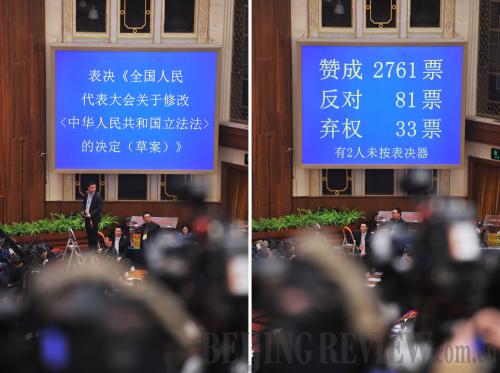|
 |
|
THE LAW IN LAWS: Deputies to the12th National People's Congress (NPC) vote on and pass an amendment to the Legislation Law during the closing meeting of the NPC annual session in Beijing on March 15 (WEI YAO) |
China's top legislative body has adopted an amendment to the Legislation Law, the foundation of the nation's legal system, to make the process of formulating and enacting laws more efficient while simultaneously reinforcing the rule of law.
Since coming into effect in July 2000, the Legislation Law has served as the cornerstone of China's legal system. It regulates how national laws, government regulations and local laws come into shape and which organizations hold the legislative power in the country.
The amendment, proposed at the beginning of last year, is intended to remove ambiguous language and legal definitions, streamline the lawmaking process, and further tighten the administration of the law.
The first priority in revising the law is to incorporate decisions and plans set by the Communist Party of China (CPC) Central Committee during its third and fourth plenary sessions, explained Li Jianguo, Vice Chairman of the National People's Congress Standing Committee, while elaborating the bill to deputies on March 8.
"The revisions are expected to improve the legislative system, raise the quality and efficiency of legislation, maintain the unity of the legal system and the nation, establish a sound system of laws, modernize China's system and the capacity for governance, and improve the country under a socialist rule of law," Li said.
Liang Ying, a member of staff with the Legislative Affairs Commission of the NPC Standing Committee, said that the bill indicated a changing role of legislation.
A decade ago a law was often an abstraction borne out of how things had been done before it was written but now they are expected to show the direction and guide the practice, Liang commented.
The legislature is also expected to accumulate consensus and help remove barriers for upcoming reform measures through making laws, which is why the Legislation Law needed to be amended, he noted.
Gu Shengzu, a member of the NPC's Financial and Economic Affairs Committee, said that only good laws can promote good governance, and that the Legislation Law was specifically formulated to produce "good laws."
"The amendment underscores the fact that people's congresses at all levels are authorized to enact legislation, and it also removes any confusion about the separation between the law and government policies, which are often regarded as one and the same," he said.
Ma Huaide, Vice President of China University of Political Science and Law, explained that the amendment stipulates exactly which bodies are allowed to enact legislation, which he stressed are a major achievement and a giant stride toward strengthening the rule of law.
According to Ma, 75 percent of the draft laws initiated at NPC meetings in the past 10 years were written by government departments, rather than people's congresses, but the new amendment clearly identifies the congresses as the only bodies authorized to make laws.
The amended law identifies the NPC as the only body authorized to draft national laws and emphasizes that the congress is in overall control of the legislative process. It also clarifies how national and local laws come into shape and carefully identifies the legislative power of each government department.
In one move, the Legislation Law expands legislative power from 49 cities in China to 282 nationwide, empowering their legislatures to make local laws.
Ma said the amended law would meet the rising clamor from cities to manage their own affairs, arguing that national laws fail to meet specific local needs.
Delegating legislative power
"It's more efficient to let locals decide their own affairs in matters like city management, environmental protection and public services," he said, adding that the delegation of legislative power to the cities doesn't extend to regulatory matters, such as regional economic and political development.
Zheng Xuejun, an NPC deputy from east China's Zhejiang Province and a newspaper editor based in Wenzhou, is excited that her city finally has the power it had been lobbying to obtain for two decades.
Known for its vigorous private businesses and strong tradition of entrepreneurship, Wenzhou is often on the frontline of China's boldest economic policies.
A pilot project of legalized private lending in operation in Wenzhou had been refused endorsement from the State Council until a local credit crisis caused by underground lending in 2011. Provincial regulation only came out after two years of the trial.
"New businesses come up and so do new problems. National and provincial laws can be late to respond to our city's situation," Zheng said.
"With the legislative power, our city can turn some of its pilot policies into more permanent arrangements and address new problems that other cities may not have," she added.
Liang with the Legislative Affairs Commission of the NPC Standing Committee said that the provision indicates a changing perspective toward both national and local governance.
| 